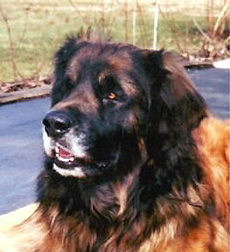| Главная » Статьи » Мои статьи |
CVM VBS Mickelson Lab_Harvey
Research carried out at the University of Minnesota, the University of Bern, and the University of California San Diego, indicates that polyneuropathy is likely a group of several genetically distinct, but clinically similar diseases. We have mapped two major genetic risk loci and identified the causative mutation in one of these loci that we now term LPN1. Dogs being homozygous mutant (two copies of the mutation) for this mutation will typically develop neuropathy before they reach 3 years of age. Dogs heterozygous for this mutation (one copy of the mutation) might also develop mild clinical signs late in life, but they will most likely not develop severe disease. The identified LPN1 mutation appears to be responsible for approximately one third of the cases of polyneuropathy in Leonbergers. The other two thirds of cases are apparently caused by different genetic mutations.
Эта болезнь, в ее классическом представлении, проявляет себя до достижения собакой трехлетнего возраста. Собака страдает от медленно ухудшающейся непереносимости физических нагрузок. Может развиться изменение в движениях, такое как "заплетаюшийся" шаг, особенно задних конечностей. Также при этом часто происходит атрофия мышц задних конечностей. Кроме того, у этих собак может быть шумное дыхание, изменение лая, или даже затрудненное дыхание из-за вовлечение гортани и гортанных сгибов в горле. В конечном итоге болезнь может прогрессировать до такой степени, что собака не может поддержать свой собственный вес. Биопсия нерва у больных собак показывают деградацию волокон нерва и потерю миелина, изоляционного материала, который в нормальном состоянии обеспечивает скорость проведения сигналов вдоль нервов. Биопсия мышцы показывают атрофию, являющуюся следствием разрушения нерва. Важно отметить, что у собак старше трех лет также могут проявляться некоторых или все эти симптомы болезни, хотя как правило, когда собаки заболевают в старшем возрасте, болезнь пртекает менее серьезно.. Исследования, апрведенные в университете Миннесоты, Бернском университете, и университете в Сан-Диего, Калифорния, показывают, что, верятно, полиневропатия - это группа нескольких генетически отличных, но клинически сходных заболеваний. Мы обозначили две главных точки генетического риска и идентифицировали мутацию, ответственную за одну из этих точек, которую мы теперь называем LPN1. У собак, являющихся гомозиготными по этой мутации (несущих в себе два гена мунта), невропатия обычно развивается прежде, чем они достигнут 3 летнего возраста. У собак гетерозиготных по этой мутации (несущих в себе один ген мутации) могут также развиться умеренные клинические признаки в более старшем возрасте, но более вероятно, что они не разовьются в серьезную болезнь. Данная идентифицированная мутация LPN1, вероятно, ответственна за приблизительно одну треть случаев полиневропатии у леонбергеров. Другие две трети случаев очевидно вызваны другими генетическими мутациями
The test for LPN1 does not account for all confirmed or suspected cases of polyneuropathy. Until additional DNA-base test(s) are developed, the only way to confirm a suspected diagnosis of LPN in dogs that test free of the LPN1 mutation is via a nerve and muscle biopsy. Both symptomatic "presumed affected" as well as asymptomatic "presumed normal" dogs biopsied to confirm this status would be a tremendous help to us in these studies. At this time we are no longer accepting blood samples from presumed normal dogs for research purposes.
This work is generously supported by the Leonberger Health Foundation (USA), the Schweizerischer (Swiss) Leonberger Club, and the Deutscher Club Für Leonberger Hunde e.V. (German Leonberger Club).
| |
| Категория: Мои статьи | Добавил: koshkax2 (08.04.2018) | |
| Просмотров: 949 |
| Всего комментариев: 0 | |
 Leonberger dogs may suffer from a neuromuscular disease called Leonberger Polyneuropathy (LPN). This disease, in its classical presentation, sets in before three years of age. The dog suffers from slowly worsening exercise intolerance and may develop gait abnormalities, such as an exaggerated hitched step, especially in the hind limbs. There is often wasting of the hind limb muscles as well. Additionally, these dogs may have noisy breathing, a change in their bark, or even difficulty breathing due to involvement of the larynx and laryngeal folds in the throat. Eventually the disease may progress to the point where the dog cannot support its own weight. Biopsies of nerve from affected dogs show degradation of the nerve fibers and loss of myelin, the insulating material that normally helps speed messages along nerves. Muscle biopsies show atrophy resulting from nerve loss. It is important to note that older dogs can also display some or all of these signs and suffer from disease, although typically when dogs are affected at an older age, the disease is less severe.
Leonberger dogs may suffer from a neuromuscular disease called Leonberger Polyneuropathy (LPN). This disease, in its classical presentation, sets in before three years of age. The dog suffers from slowly worsening exercise intolerance and may develop gait abnormalities, such as an exaggerated hitched step, especially in the hind limbs. There is often wasting of the hind limb muscles as well. Additionally, these dogs may have noisy breathing, a change in their bark, or even difficulty breathing due to involvement of the larynx and laryngeal folds in the throat. Eventually the disease may progress to the point where the dog cannot support its own weight. Biopsies of nerve from affected dogs show degradation of the nerve fibers and loss of myelin, the insulating material that normally helps speed messages along nerves. Muscle biopsies show atrophy resulting from nerve loss. It is important to note that older dogs can also display some or all of these signs and suffer from disease, although typically when dogs are affected at an older age, the disease is less severe.